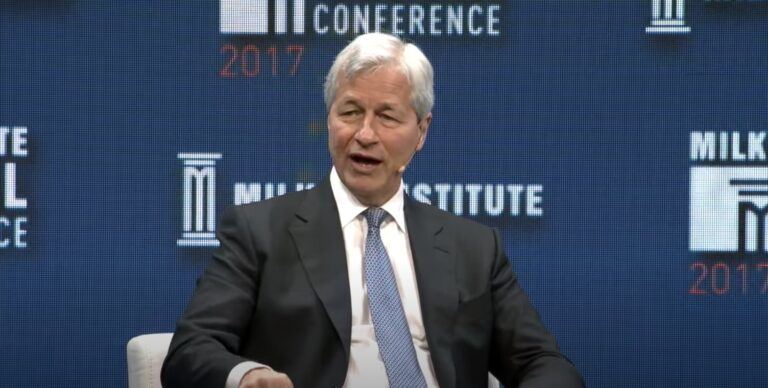On 10 January 2024, Jamie Dimon, the Chairman of the Board and CEO of global financial services firm JPMorgan Chase & Co., appeared on Fox Business’s “Mornings with Maria,” which is hosted by Maria Bartiromo. He discussed various topics, including the U.S. economy, impending bank regulations, and his views on cryptocurrency.
Succession at JPMorgan Chase
Dimon addressed questions about his successor, stating that it’s ultimately a decision for the board. He mentioned that the board has in mind five or six potential candidates, emphasizing the importance of choosing the best person for the job, regardless of gender. He praised the senior women and men in the firm but dismissed the idea of a public ‘horse race’ for his succession.
The U.S. Economic Outlook for 2024
Dimon expressed more concern about geopolitical issues than the economy in the short term, citing their importance for the freedom of the Western world. For JPMorgan, he emphasized readiness for various market conditions, noting that consumer finances are currently strong but the extra money from COVID-19 relief is running out. He expressed skepticism about a ‘Goldilocks scenario’ and mentioned the possibility of a mild or heavy recession due to factors like high rates, the end of quantitative easing (QT), and government deficits.
Federal Reserve’s Role and Predictions
Dimon discussed the Federal Reserve’s interest rate policies, expressing skepticism about the market’s expectation of rate cuts. He listed several factors, including fiscal deficits and global events, that could lead to inflationary pressures, comparing the situation to the 1970s. He emphasized the need for readiness for potential changes in implied curves.
Bank Regulations and Basel III End Game Proposals
Dimon criticized the new regulations requiring higher capital levels for major banks. He argued that these regulations would affect everything from mortgages to small business loans and expressed concern about U.S. banks needing to hold more capital than their foreign competitors. He called some aspects of the regulations, like operational risk capital and GSIB, ‘asinine’ and anti-diversification.
Views on Bitcoin and Cryptocurrency Regulation
Dimon reiterated his critical stance on Bitcoin, citing its alleged use in illegal activities, such as tax evasion. He argued that the primary use cases of Bitcoin are not just buying and selling but are instead linked to illicit activities. He questioned the value of Bitcoin and suggested that if he were in government, he would consider shutting it down.
On December 6, 2023, at the Senate Banking Committee’s ‘Annual Oversight of Wall Street Firms’ hearing, Dimon voiced his strong disapproval of cryptocurrencies, suggesting that the government should contemplate shutting down the sector. He highlighted concerns about cryptocurrencies circumventing governmental oversight and their potential attractiveness to malicious entities.
“I am fundamentally against crypto, bitcoin, and the like… If it were up to me, I would shut it down,” Dimon stated.
Dimon’s stance was consistent with his previous statements on digital currencies, where he has cautioned people against Bitcoin and called for more stringent regulations on stablecoins.
These remarks come amid heightened scrutiny of the crypto industry in Washington. Sarah Wynn, reporting for The Block, noted that Senator Elizabeth Warren is advocating for the Digital Asset Anti-Money Laundering Act. This legislation seeks to broaden the application of Know Your Customer (KYC) regulations to various entities in the cryptocurrency sector.
In the course of the hearing, Warren engaged Dimon and other leading bank CEOs, including Charles Scharf of Wells Fargo, Brian Moynihan of Bank of America, and David Solomon of Goldman Sachs, in a discussion about cryptocurrency regulations. All four CEOs unanimously agreed on the necessity of applying the same anti-money laundering standards to the crypto industry as are applied to traditional financial institutions.
Senator Warren, highlighting the rare consensus among these bank leaders, remarked that despite seldom agreeing with the heads of major banks, she recognizes the importance of joint efforts in this matter, considering it a national security issue.









